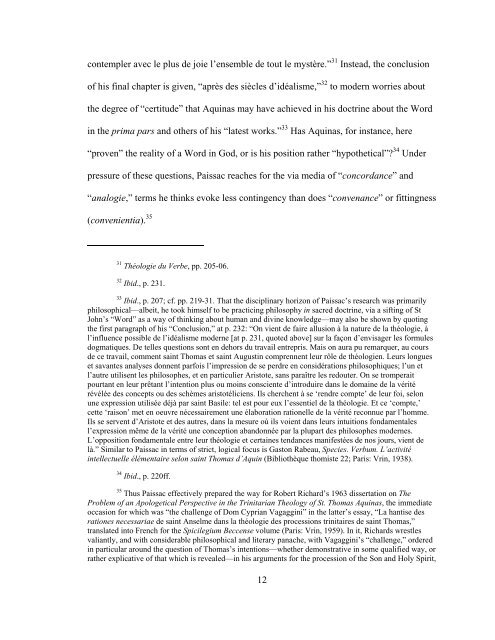SACRAMENTS OF THE INCARNATE WORD - ETD - University of ...
SACRAMENTS OF THE INCARNATE WORD - ETD - University of ...
SACRAMENTS OF THE INCARNATE WORD - ETD - University of ...
You also want an ePaper? Increase the reach of your titles
YUMPU automatically turns print PDFs into web optimized ePapers that Google loves.
contempler avec le plus de joie l’ensemble de tout le mystère.” 31 Instead, the conclusion<br />
<strong>of</strong> his final chapter is given, “après des siècles d’idéalisme,” 32 to modern worries about<br />
the degree <strong>of</strong> “certitude” that Aquinas may have achieved in his doctrine about the Word<br />
in the prima pars and others <strong>of</strong> his “latest works.” 33 Has Aquinas, for instance, here<br />
“proven” the reality <strong>of</strong> a Word in God, or is his position rather “hypothetical”? 34 Under<br />
pressure <strong>of</strong> these questions, Paissac reaches for the via media <strong>of</strong> “concordance” and<br />
“analogie,” terms he thinks evoke less contingency than does “convenance” or fittingness<br />
(convenientia). 35<br />
31 Théologie du Verbe, pp. 205-06.<br />
32 Ibid., p. 231.<br />
33 Ibid., p. 207; cf. pp. 219-31. That the disciplinary horizon <strong>of</strong> Paissac’s research was primarily<br />
philosophical—albeit, he took himself to be practicing philosophy in sacred doctrine, via a sifting <strong>of</strong> St<br />
John’s “Word” as a way <strong>of</strong> thinking about human and divine knowledge—may also be shown by quoting<br />
the first paragraph <strong>of</strong> his “Conclusion,” at p. 232: “On vient de faire allusion à la nature de la théologie, à<br />
l’influence possible de l’idéalisme moderne [at p. 231, quoted above] sur la façon d’envisager les formules<br />
dogmatiques. De telles questions sont en dehors du travail entrepris. Mais on aura pu remarquer, au cours<br />
de ce travail, comment saint Thomas et saint Augustin comprennent leur rôle de théologien. Leurs longues<br />
et savantes analyses donnent parfois l’impression de se perdre en considérations philosophiques; l’un et<br />
l’autre utilisent les philosophes, et en particulier Aristote, sans paraître les redouter. On se tromperait<br />
pourtant en leur prêtant l’intention plus ou moins consciente d’introduire dans le domaine de la vérité<br />
révélée des concepts ou des schèmes aristotéliciens. Ils cherchent à se ‘rendre compte’ de leur foi, selon<br />
une expression utilisée déjà par saint Basile: tel est pour eux l’essentiel de la théologie. Et ce ‘compte,’<br />
cette ‘raison’ met en oeuvre nécessairement une élaboration rationelle de la vérité reconnue par l’homme.<br />
Ils se servent d’Aristote et des autres, dans la mesure où ils voient dans leurs intuitions fondamentales<br />
l’expression même de la vérité une conception abandonnée par la plupart des philosophes modernes.<br />
L’opposition fondamentale entre leur théologie et certaines tendances manifestées de nos jours, vient de<br />
là.” Similar to Paissac in terms <strong>of</strong> strict, logical focus is Gaston Rabeau, Species. Verbum. L’activité<br />
intellectuelle élémentaire selon saint Thomas d’Aquin (Bibliothèque thomiste 22; Paris: Vrin, 1938).<br />
34 Ibid., p. 220ff.<br />
35 Thus Paissac effectively prepared the way for Robert Richard’s 1963 dissertation on The<br />
Problem <strong>of</strong> an Apologetical Perspective in the Trinitarian Theology <strong>of</strong> St. Thomas Aquinas, the immediate<br />
occasion for which was “the challenge <strong>of</strong> Dom Cyprian Vagaggini” in the latter’s essay, “La hantise des<br />
rationes necessariae de saint Anselme dans la théologie des processions trinitaires de saint Thomas,”<br />
translated into French for the Spicilegium Beccense volume (Paris: Vrin, 1959). In it, Richards wrestles<br />
valiantly, and with considerable philosophical and literary panache, with Vagaggini’s “challenge,” ordered<br />
in particular around the question <strong>of</strong> Thomas’s intentions—whether demonstrative in some qualified way, or<br />
rather explicative <strong>of</strong> that which is revealed—in his arguments for the procession <strong>of</strong> the Son and Holy Spirit,<br />
12
















